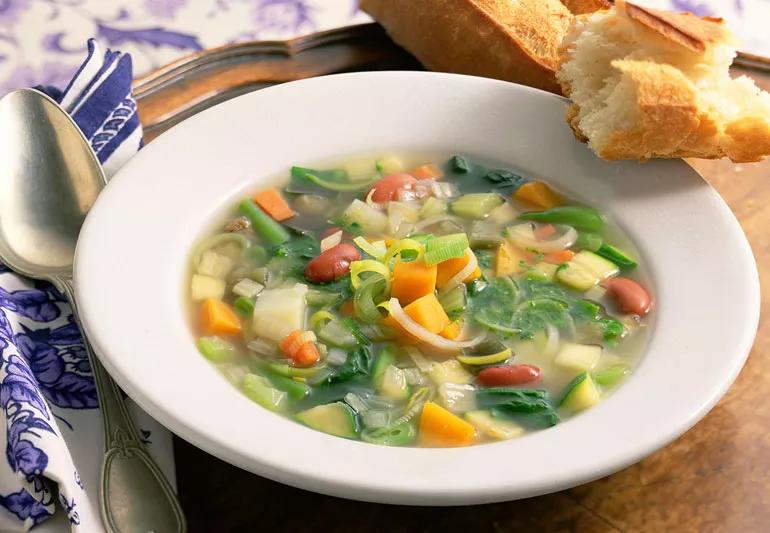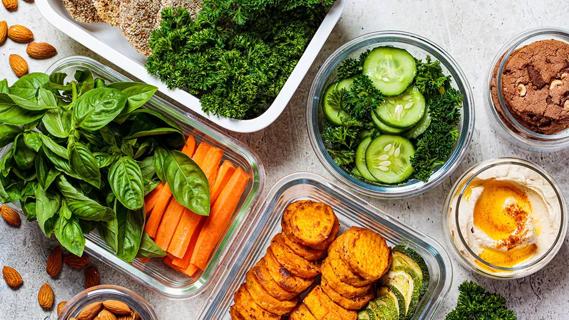Comfort food doesn’t have to be unhealthy

Chilly winter weather affects more than just your wardrobe and heating bill. Your body also experiences changes in energy levels, metabolism and even food preferences.
Advertisement
Cleveland Clinic is a non-profit academic medical center. Advertising on our site helps support our mission. We do not endorse non-Cleveland Clinic products or services. Policy
Do you react to bitter cold by skipping the gym and convincing yourself you deserve a calorie splurge to warm up and offset your discomfort? You’re not alone.
But the cold truth is, no weather warrants unhealthy eating habits. Just as you shouldn’t overdo ice cream during the dog days of summer, you shouldn’t live on a steady diet of hot chocolate and warm cookies during winter (no matter how tempting it sounds).
We asked some experts how to adjust our mindsets and palates for the winter.
“Winterizing your diet can be healthy — and tasty — if you add a few favorite cold-weather foods,” says registered dietitian Beth Czerwony, RD, LD.
Not only are the following food options healthy, but did you know they can also boost your mood? Psychologist Susan Albers, PsyD, adds in her vitamin D-rich favorites, to Czerwony’s recommendations, below.
Local produce can be hard to find when cold weather hits. But root vegetables like beets, carrots and turnips can withstand the cold, so local farmers can provide fresh produce — and you can reap the benefits. Roast carrots for a boost of beta-carotene, or boil turnips for vitamins C and A.
“Vitamin D-rich foods are the number one food item to consider adding to your menu during the winter months. People who have more emotional eating during the fall are shown to have lower levels of vitamin D, which is associated with more anxiety and depression,” Dr. Albers explains.
Advertisement
She says a great source of vitamin D is shitake mushrooms. Other good options include salmon, egg yolks, fortified cereals, milk and red meat.
Oatmeal is much more than just a convenient breakfast food; it also provides nutrients that are essential during the winter. Oatmeal can be changed up by adding warm spices like cinnamon, cardamom and nutmeg without adding calories, fat, sugar or salt. And oatmeal is high in zinc (important for proper immune function) and soluble fiber (associated with heart health). Although instant oatmeal is more convenient, it’s a bit more expensive. To eat healthy on a budget, go with old-fashioned oats.
Soup is winter’s perfect food — as long as you hold the cream, salt and beef. Look for soup recipes that call for chicken broth, vegetable broth or water as the base and include a lot of vegetables. Adding canned or dried beans or lentils to your soup adds fat-free protein, as well as much needed fiber. Protein and fiber both curb your appetite by slowing down digestion and controlling blood sugars, which can help with controlling hunger and bolstering mood. Pair your soup with a side of 100% whole-grain crackers for a dose of grains, too.
Cravings and emotional eating are also common this time of year. Try avoiding grabbing those sugary and processed snacks, which can drag down your mood over time. Instead, Dr. Albers recommends sweet potatoes, beets and walnuts. Spicy roasted chickpeas are another alternative.
Dr. Albers says what you eat can not only impact your mood and sleep, but also your immune system.
“One of the best things you can do to help your immune system and boost your mood is add foods that are high in vitamin C. These are foods like citrus fruits, oranges, mangoes, lemons, kiwis, but they are also found in broccoli, bell peppers and strawberries,” she advises.
For a surprising alternative to typical comfort foods — often loaded with fat and sugar — try sushi. Choose rolls lined with tuna or salmon. Both are good sources of vitamin D. During the winter months, when you have limited exposure to the sun, food sources of the bone-healthy vitamin become even more essential. Vitamin D deficiency is associated with impaired growth, weakening of your bones and even risk of heart disease.
Aside from getting the flu shot and washing your hands regularly, these cruciferous vegetables may be your top defense against winter illness. Broccoli and cauliflower are both high in vitamin C, which is associated with enhanced immune function. If you can’t find fresh versions, don’t fret — frozen broccoli and cauliflower are just as nutritious.
Czerwony and Dr. Albers both agree that mindful, healthy eating choices are helpful to a stress-free lifestyle. If you’re feeling overwhelmed about overhauling your whole diet, take it one step at a time, or substitute one snack at a time. And remember, seasons change!
Advertisement
Advertisement
Learn more about our editorial process.
Advertisement

With a focus on internal cues for hunger and fullness, this eating style may revolutionize your relationship with food

Review the ingredients, watch for sugar and fat, and choose one with the right amount of protein for your needs

A typical recommended balanced diet is half fruits and veggies, a quarter protein and a quarter grains

Foods high in protein, fiber and water can help keep hunger at bay

This quirky food trend is harmless, as long as you’re getting enough protein, fiber and healthy fats

Wrapped or sandwiched, try to choose fillings and condiments that are minimally processed, low in saturated fat and high in fiber

Set yourself up for success by carefully choosing your recipes, storage containers and prepping day

These breaks may have some benefits — but they promote an unhealthy attitude toward food

If you’re feeling short of breath, sleep can be tough — propping yourself up or sleeping on your side may help

If you fear the unknown or find yourself needing reassurance often, you may identify with this attachment style

If you’re looking to boost your gut health, it’s better to get fiber from whole foods